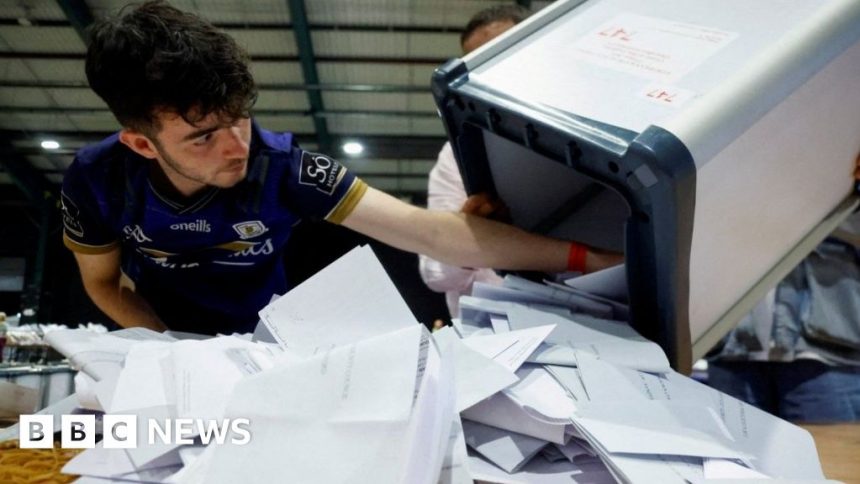Sinn Féin under pressure in Irish elections
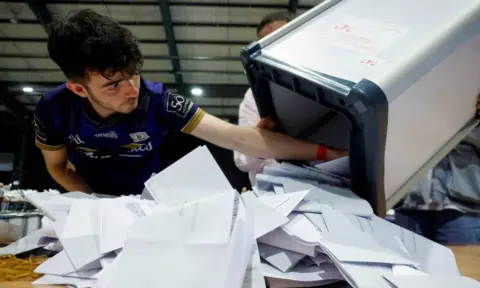 Reuters
Reuters A senior Sinn Féin politician has said the party is not expected to receive the result the party was hoping for in the local Irish government elections.
Counting began for the European elections on Sunday and for the local council elections on Saturday.
Voters headed to the polls in three elections on Friday.
Sinn Féin, the main opposition party, is expected to have more councillors elected to local authorities, but not as many as it wanted or expected.
Despite a “disappointing” performance in the election, Mary Lou McDonald has said she has no plans to step down as Sinn Féin party leader.
Speaking to RTÉ, Ms McDonald said: “Obviously it hasn’t been our day.”
She said that the party had made some gains, albeit modest ones.
“We will listen to people, we will reflect, we will learn, and we will regroup,” she added.
‘A lot of disappointment’
Pearse Doherty, TD (member of parliament) for Donegal, told RTÉ that the party would have to “dust themselves down” and look at “lessons that can be learned”.
“We will make some gains in some counties and they will be well won and well fought for, but it is not the result we hoped for,” he said.
“There will be a lot of disappointment for some of our new candidates who were trying to break new ground.
“The key thing is that there are strong indicators as well coming from the three European constituencies and there is a lot to play for.”
With a general election ahead, Mr Doherty said he still believes people want change.
“People need to ask themselves if they want Fine Gael and Fianna Fáil for the next five years,” he said.
“And if they do, they will vote the same way they did in the local elections but if they don’t, then they’re going to have to vote for something different.”
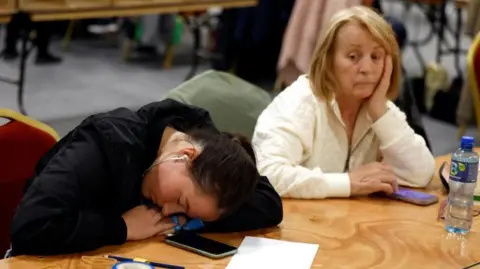 Reuters
ReutersThe polls will provide political parties with an insight into voter sentiment.
The current Irish government has been in place since June 2020, when Fine Gael, Fianna Fáil and the Green Party voted to enter a coalition together.
The next election must be held by March 2025.
Early indications suggest the governing parties will not suffer losses on a scale that many had predicted.
Tánaiste (deputy prime minister) and Fianna Fáil leader Michéal Martin said his party had performed “far better” than predicted.
‘Game on’
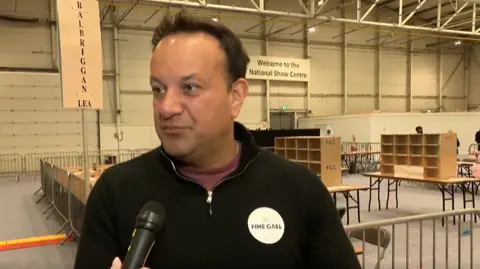 RTÉ
RTÉSpeaking to RTÉ this afternoon, Fine Gael leader and former taoiseach Leo Varadkar said the party will be “slightly down” on where it was in the 2019 local elections.
However, he added that “it looks like we’ll be the largest party in local government which I don’t think we’ve been since 2009”.
“For a party that’s been in government for nearly 14 years to win the local elections, and it does look like we’re going to win the local elections, that’s an extraordinary result,” Mr Varadkar said.
He said that if he learnt anything from the local election five years ago, “local elections and European elections don’t inform the general election necessarily”.
Mr Varadkar said it is now “game on”.
“Anyone who thought the election was a foregone conclusion, they’ve been corrected, I think, but important not to read too much into it or believe that we’re going to now somehow sail to a fourth term in government, it doesn’t work like that,” he said.
‘Problem’
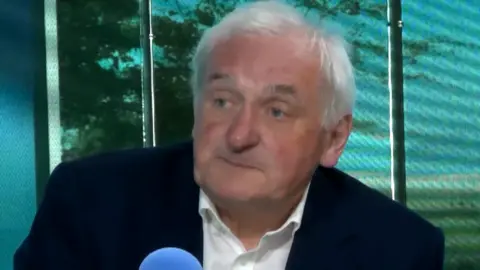 RTE
RTEFormer taoiseach (prime minister) Bertie Ahern said Sinn Féin’s popularity bounce during the last general election “wasn’t real”.
Speaking to RTÉ, he said: “I think now they have a problem because if you start going down to the extent that they are it’s a real problem for them.”
He also thinks the government parties will be happy with the local election results, adding that “we will see” when it comes to the European results.
Analysis – BBC News NI’s Dublin reporter Aoife Moore
It’s 24 hours since the first ballot boxes were opened in the Republic of Ireland and a clearer picture is emerging.
It appears the taoiseach’s party, Fine Gael, will be the largest party in local government, taking over from Fianna Fáil.
The bounce may be linked to new leader Simon Harris who has moderately increased the party’s standing in the polls since Leo Varadkar’s resignation in March.
Party sources say they are buoyed by the successful and accurate candidate selection arithmetic.
Meanwhile, Sinn Féin are disappointed so far with their performance.
The story of the weekend may prove to be the independents, who have done well nationally, however, due to the diverse nature of the candidates, very little can be garnered about the outlook of those voting for independents.
The first elections for new leaders for Labour’s Ivana Bacik and the Social Democrats Holly Cairns look moderately successful, however, no big wins have been delivered for those parties either.
 PA
PA
As well as picking candidates to send to the European Parliament, the Irish public voted to elect a swathe of new councillors and, for the first time, some were asked to decide on a directly-elected mayor to represent them.
The first of the local election results were declared on Saturday.
So far, more than 300 seats out of the 949 seats have been declared.
Although Irish voters turned out on Friday, results for the European elections cannot be released until every country has finished voting later on Sunday.
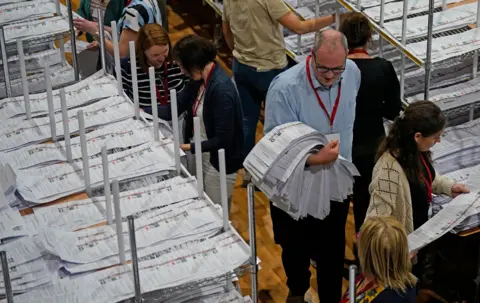 PA
PAFourteen MEPs will be elected across three constituencies to represent Ireland at the next European Parliament.
Five will represent the constituency of Midlands North-West, a 15-county constituency in which 27 candidates ran.
Five will represent Ireland South, where 23 candidates ran across 10 counties.
And four will represent Dublin, where there were also 23 candidates on the ballot.
Why are Ireland’s EU results being counted late?
Some 373 million people across the European Union are eligible to vote in this election.
Together, voters in its 27 member states will elect 720 MEPs. It is the second biggest democratic election in the world after India.
However, under European law, results cannot be announced until all countries have finished voting.
Voting takes place across four days, and began with the Netherlands on 6 June and Ireland on 7 June.
Some countries voted on 8 June and 20 others on 9 June.
Each country is given seats proportionate to their population.
In the next parliament, Germany will have the most amount of seats with 96, whereas Cyprus, Luxembourg and Malta will have six.
Results will be announced after 22:00 BST on Sunday evening.
What about the local elections?
More than 2,100 candidates had been selected or declared to fill a total of 949 city and county council seats across 31 authorities.
The full results will take days to be finalised because Ireland uses a system of proportional representation which allows voters to rank candidates by order of preferences.
Ballot papers are sorted and counted multiple times by hand.



